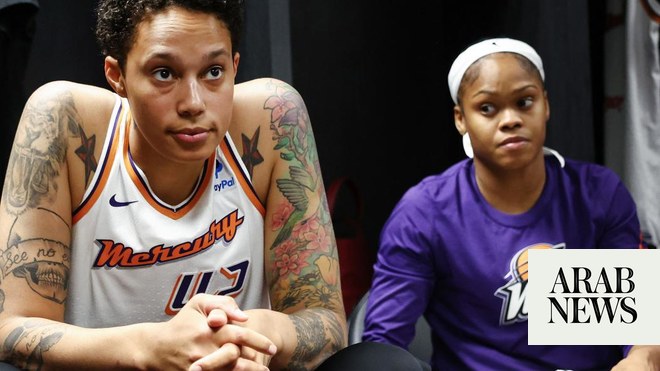
The American basketball star Brittney Griner returned to the US early on Friday after being freed in a high-profile prisoner exchange from nearly 10 months in detention in Russia.
The deal, in which she was swapped for the Russian arms dealer Viktor Bout, secured the release of the most prominent American detained abroad and achieved a top goal for Joe Biden. But Washington failed to win freedom for another US citizen, Paul Whelan, who has been jailed for nearly four years.
Griner is a two-time Olympic gold medallist, Baylor University All-American and Phoenix Mercury pro basketball star. Her status as an openly gay Black woman, locked up in a country where authorities have been hostile to the LBGTQ+ community, injected racial, gender and social dynamics into her legal saga and brought unprecedented attention to the population of wrongful detainees.
Biden’s authorisation to release Bout, once nicknamed “the Merchant of Death”, underscored the heightened urgency that his administration faced to get Griner home, particularly after the recent resolution of her criminal case on drug charges and her subsequent transfer to a penal colony.
Griner was seen getting off a plane at joint base San Antonio-Lackland in Texas.
The athlete, who also played pro basketball in Russia, was arrested at an airport there in February after authorities said she was carrying vape canisters with cannabis oil. Before her conviction, the US state department declared her to be wrongfully detained, a charge that Russia has sharply rejected.
The Russian foreign ministry confirmed Thursday’s swap, saying in a statement carried by Russian news agencies that the exchange had taken place in Abu Dhabi and that Bout had been flown home.
Biden spoke by phone to Griner. US officials said she would be offered specialised medical services and counselling.
In releasing Bout, the US freed a former Soviet army lieutenant colonel whom the justice department once described as one of the world’s most prolific arms dealers. He was arrested in Thailand in 2008 and extradited to the US in 2010.
Bout was serving a 25-year sentence on charges that he conspired to sell tens of millions of dollars in weapons that US officials said were to be used against Americans.
Griner was arrested at Moscow’s Sheremetyevo airport in February and pleaded guilty in July but still faced trial because confession does not automatically end a case in Russia’s judicial system.
She acknowledged in court that she possessed canisters with cannabis oil, but said she had no criminal intent and had packed them accidentally. Her defence team presented written statements that she had been prescribed cannabis to treat pain.
Before landing in the US early on Friday, television footage showed Griner and Bout passing each other on an airport apron in the United Arab Emirates, in a classic prisoner swap maneuver.
Dawn Staley, former head of the US women’s Olympic basketball team and now head coach for the University of South Carolina women’s basketball team, and a longtime friend of Griner told PBS on Thursday evening that she cried tears of joy to hear that Griner was being released.
“To know that she’s coming home is a weight that’s lifted,” she said.
After landing in San Antonio, Texas, in the early hours of Friday, Griner was taken to a US army medical center to be evaluated.
Footage of her on the plane home showed her grinning and appearing to say she was happy.
“So happy to have Brittney back on US soil. Welcome home BG!” US special presidential envoy Roger Carstens, the chief US hostage coordinator, said in a post on Twitter.
The Russian deputy foreign minister, Sergei Ryabkov, said Moscow and Washington would continue to talk about possible prisoner swaps directly, without intermediaries, the RIA Novosti news agency reported.
The two countries also swapped prisoners in April when Russia released the former US marine Trevor Reed and the US released the Russian pilot Konstantin Yaroshenko.
Former New Mexico governor and diplomat Bill Richardson, who played a significant role in securing Griner’s release, said on Friday morning of Joe Biden that: “I think Biden got the edge [over Russian president Vladimir Putin], because we got an American icon.”
He said he thought Biden “deserves credit” for the deal, even though it raised concerns about whether such deals encourage further hostage-taking, as well as the unsavoury aspect of handing a major criminal back to Russia – and without securing the release of Whelan, who is in a Russian penal colony accused of spying, which he and the US government deny.
Richardson said he has been working for four years for Whelan’s release and while he was not home now “there’s light at the end of the tunnel”, he told ABC’s Good Morning America on Friday.
Whelan’s brother David Whelan also spoke to ABC.
“We’re a little disappointed right now to I guess realize the US government isn’t in a position where it knows what it’s going to do next … [but] there’s always hope,” he said.
Some Republicans criticized the prisoner swap, either on principle or its terms.
Florida senator Marco Rubio told reporters on Friday: “We have to recognize, even as we’re happy an American’s coming home, it does incentivize the taking of more Americans.”
And Illinois congressman Adam Kinzinger appeared displeased that Whelan was left out, tweeting in the direction of Biden: “What about retired marine who has been unjustly detained for years, Paul Whelan? Surely an arms dealer is worth two innocent people? @POTUS.”
But Tristan Snell, a political analyst and lawyer who helped prosecute the Trump University scam noted that Trump, as president, secured the release of Taliban leader Abdul Ghani Baradar from a Pakistani prison in 2018 with no apparent quid pro quo.












